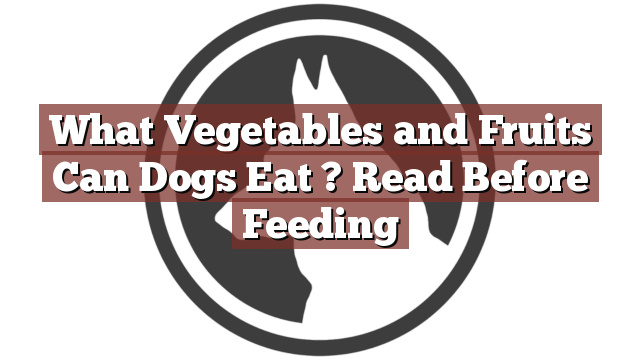Understanding Your Dog’s Dietary Needs
As a responsible dog owner, it is crucial to understand your furry friend’s dietary needs. While dogs primarily thrive on a diet rich in animal protein, they can also benefit from the inclusion of certain vegetables and fruits in their diet. These plant-based foods can provide essential nutrients, vitamins, and fiber that contribute to a well-rounded and balanced diet for your canine companion.
What Vegetables and Fruits Can Dogs Eat? Read Before Feeding
It is important to note that not all vegetables and fruits are safe for dogs to consume. Before incorporating any new food into your dog’s diet, it is essential to be aware of what is safe and what should be avoided. Here are some vegetables and fruits that are generally considered safe for dogs:
-
Carrots: Carrots are an excellent source of vitamins A, K, and C, as well as fiber. They are low in calories and can provide a tasty and crunchy snack for your dog.
-
Apples: Apples are a great source of vitamins A and C, as well as fiber. However, it is important to remove the seeds and core, as they can be a choking hazard and contain traces of cyanide.
-
Blueberries: Blueberries are packed with antioxidants, vitamins, and fiber. They make a delicious and healthy treat for your dog, promoting overall well-being.
On the other hand, some vegetables and fruits should be strictly avoided when it comes to feeding your dog. These include grapes, raisins, onions, garlic, and avocadoes, which can be toxic and pose serious health risks to your furry friend.
Pros and Cons of Feeding Vegetables and Fruits to Dogs
Feeding your dog vegetables and fruits can have several benefits. These include:
-
Nutritional Value: Certain vegetables and fruits can provide essential vitamins, minerals, and fiber that contribute to your dog’s overall health and well-being.
-
Weight Management: Incorporating vegetables and fruits into your dog’s diet can help manage their weight, as these foods are typically low in calories and high in fiber.
-
Improved Digestion: The fiber content in certain vegetables and fruits can promote healthy digestion and prevent gastrointestinal issues in your dog.
However, it is important to consider the potential drawbacks as well. Some dogs may have allergies or sensitivities to certain vegetables or fruits. Additionally, overfeeding can lead to an upset stomach or even nutritional imbalances. Always consult with your veterinarian before introducing any new foods into your dog’s diet to ensure it aligns with their specific needs.
Conclusion: Choose Wisely to Ensure a Healthy Diet for Your Dog
In conclusion, while dogs primarily require a diet rich in animal protein, the inclusion of certain vegetables and fruits can provide additional nutritional benefits. However, it is crucial to choose wisely and avoid any potentially harmful foods such as grapes, raisins, onions, garlic, and avocadoes. As a responsible dog owner, always consult with your veterinarian to determine the best dietary choices for your furry friend. By doing so, you can ensure a healthy and well-balanced diet that supports your dog’s overall health and happiness.
Thank you for taking the time to read through our exploration of [page_title]. As every dog lover knows, our furry friends have unique dietary needs and responses, often varying from one canine to another. This is why it's paramount to approach any changes in their diet with caution and knowledge.
Before introducing any new treats or making alterations to your dog's diet based on our insights, it's crucial to consult with a veterinarian about [page_title]. Their expertise ensures that the choices you make are well-suited to your particular pet's health and well-being.
Even seemingly harmless foods can sometimes lead to allergic reactions or digestive issues, which is why monitoring your dog after introducing any new food item is essential.
The content provided here on [page_title] is crafted with care, thorough research, and a genuine love for dogs. Nevertheless, it serves as a general guideline and should not be considered a substitute for professional veterinary advice.
Always prioritize the expert insights of your veterinarian, and remember that the health and happiness of your furry companion come first.
May your journey with your pet continue to be filled with joy, love, and safe culinary adventures. Happy reading, and even happier snacking for your canine friend!

